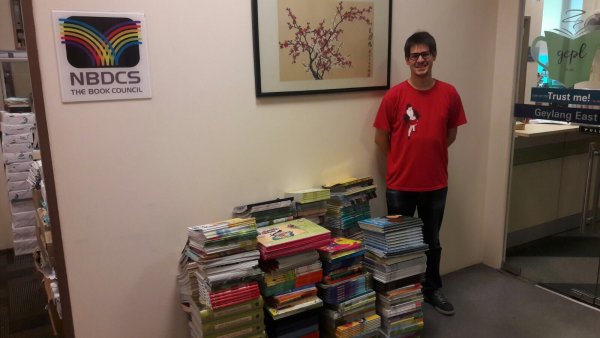I have been with the Book Council for nearly three years, and have been running the awards programmes since then. It’s been a pretty wild ride, especially in my first year when I was thrown in the deep end and made to run the newly-expanded Singapore Literature Prize as soon as I joined.
“Awards Management” is a weird sort of job description that can’t really be trained for. It combines logistics, event planning and management, creative design, public relations, publishing, sponsorship canvassing, website design, marketing, project management, coding, and even occasionally being a personal assistant in a strange mix that no one ever truly understands until they actually do it. I attended an awards management conference last year, full of awards programme managers from around the world. We were asked to raise our hands if we had trained for the job we now had, and not a single hand went up. We were asked to raise our hands if we had actively sought the job of “awards management”, and again, not a single hand went up. We had all started in one of the jobs listed at the beginning of this paragraph, and then fallen into awards management by complete accident.
The most important thing I’ve learned about awards management is that there are a lot of moving pieces that need to be kept moving at the right times, turning them on and off as required. Missing a step may not stop the machine in its tracks, but it will likely make a horrifyingly loud and embarrassing sound that everyone will notice (*koff* Oscars *koff*).
The Book Council’s newest award, the AFCC Asian Children’s Book Award by Genting Singapore, is similar to the Book Council’s other awards in terms of how it’s run and managed, but quite different in terms of scope and scale. We have two other awards that are Asia-wide (the Scholastic Asian Book Award and the Scholastic Picture Book Award), but this is the first Asia-wide award for published work. Our partner for this award, Genting Singapore, has been great at helping the Book Council get the word out across Asia (marketing!). And this showed in the record-breaking number of submissions we received: 245 entries from 25 countries, ranging from Indonesia, Japan, Korea, and Singapore in the east, through Bangladesh, India, and Russia, all the way to Cyprus, Palestine, Syria, and Turkey in the west.
This is what six copies of 245 titles look like when all stacked up next to an increasingly chubby Awards Manager.
These books were mailed to our five incredibly capable judges (who you will get to meet in April, when they announce their shortlist) in ten very large cartons (logistics!). They will read every book and collectively decide which book they think is best deserving of the prize for best Asian picture book. The winners will receive SG$30,000: SG$10,000 for the writer(s), SG$10,000 for the illustrator(s), and SG$10,000 for the translator(s). In the case where no official translation exists, the SG$10,000 translator prize will instead converted into a grant for the publisher to publish a translation of the winning book.
Translation is something that’s very important to the Book Council, and we are always looking for ways to promote it. Asia is a very large and very varied place, with a multitude of languages, and the only way to share those stories with others is to translate them into languages others may understand. If we can understand each other’s stories, maybe we can understand each other a little better too.
The shortlist will be announced on 20 April, and the winner will be announced at Indonesia Night of this year’s Asian Festival of Children’s Content (event planning and management!), at which point I can breathe a little easier.
For a short time, anyway. I’ll soon have to start the process for the next slate of awards for the following year (project management!).
- Adan Jimenez ([email protected])

Comments
There are no comments for this entry yet.
Commenting is not available in this channel entry.